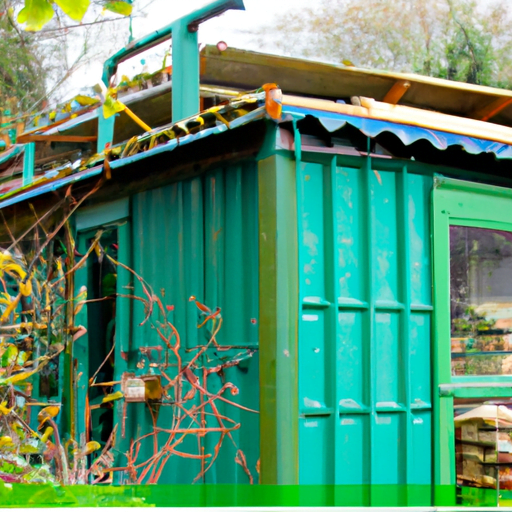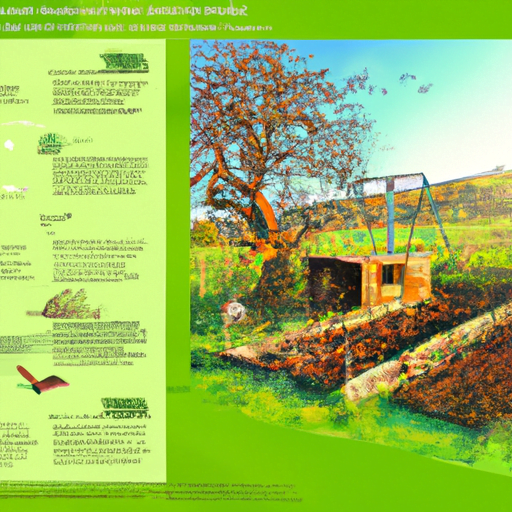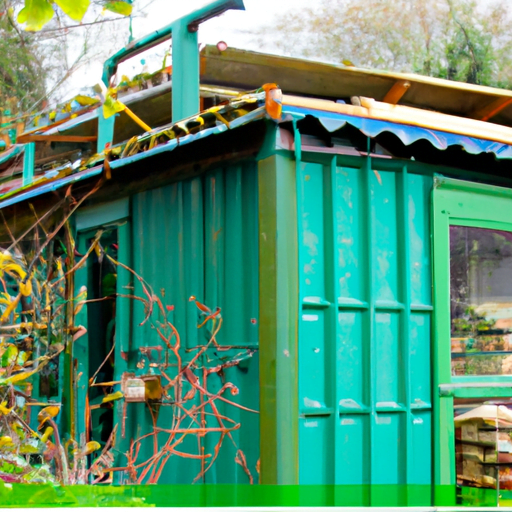So, have you ever wondered if it’s possible to live in a cabin in your own garden in the UK? Well, the answer is yes, and it’s actually becoming quite popular. Living off-grid is a lifestyle choice that allows you to disconnect from the traditional power grid and live a more self-sustainable and environmentally friendly life. In a garden cabin, you have the freedom to generate your own electricity, collect your own water, and grow your own food. It’s like having a mini homestead right in your backyard!
Imagine waking up every morning to the sound of birds chirping and the sight of lush greenery surrounding you. Living in a garden cabin allows you to be closer to nature and enjoy a simpler, more peaceful way of life. It’s like having your own mini retreat where you can escape the hustle and bustle of everyday life. Plus, you’ll have the opportunity to grow your own vegetables and herbs, providing you with fresh and organic food right at your doorstep.
In addition to the connection with nature, living off-grid in a garden cabin can also have a positive impact on the environment. By generating your own electricity through solar panels or wind turbines, you reduce your carbon footprint and contribute to a cleaner and greener planet. You’ll also have the chance to embrace more sustainable practices, such as composting and rainwater harvesting, which further lessen your impact on the environment. In our upcoming article, we’ll dive deeper into the details and benefits of living off-grid in a garden cabin in the UK, so stay tuned to learn more!

The Appeal of Off-Grid Living
The Benefits of Living Off-Grid
If you’re tired of the fast-paced, high-tech lifestyle and longing for a simpler, more environmentally friendly way of living, then off-grid living in a garden cabin might be the perfect solution for you. Living off-grid means disconnecting from the public utility services and instead relying on self-sustaining and renewable energy sources. Not only does this lifestyle offer a sense of independence and freedom, but it also has a positive impact on the environment.
Freedom from Utility Bills
One of the most appealing aspects of living off-grid is the freedom it provides from utility bills. By generating your own electricity and reducing your dependence on public services, you can significantly reduce or even eliminate monthly bills. Imagine not having to worry about sky-high electricity or water bills, and instead using that money for things that truly matter to you. Living off-grid gives you the power to be financially independent and in control of your expenses.
Reduced Environmental Impact
In a world where climate change and environmental degradation are major concerns, off-grid living offers a sustainable alternative. By generating your own electricity from renewable sources such as solar, wind, or hydroelectric power, you can significantly reduce your carbon footprint. You’ll be actively contributing towards a cleaner and greener planet, knowing that your lifestyle choices are not harming the environment. It’s a small but significant step towards a more sustainable future.
Self-Sufficiency and Connection to Nature
Living off-grid in a garden cabin allows you to reconnect with nature and adopt a self-sufficient lifestyle. You’ll learn to rely on your own resources, such as growing your own food, harvesting rainwater, and managing waste. This connection to nature not only improves your physical and mental well-being but also provides a deeper appreciation for the natural world. The peacefulness and tranquility of living off-grid can be a refreshing change from the hustle and bustle of city life.
Building Your Garden Cabin
Choosing the Perfect Location
Before constructing your garden cabin, it’s essential to choose the right location. Consider factors such as sunlight exposure, accessibility, and privacy. Make sure the location is suitable for the size of your cabin and that it aligns with any local regulations or restrictions. A spot that receives ample sunlight is ideal for installing solar panels and maximizing energy generation.
Permits and Regulations
Before embarking on your off-grid adventure, it’s crucial to familiarize yourself with local permits and regulations. Ensure that your cabin construction adheres to building codes and any zoning restrictions in your area. Contact your local authorities to obtain the necessary permits and ensure you are complying with all regulations. This step will prevent any legal issues down the line and ensure a smooth off-grid living experience.
Designing and Constructing the Cabin
When designing your garden cabin, focus on maximizing energy efficiency and sustainable practices. Incorporate insulation materials and efficient windows to retain heat and minimize energy consumption. Opt for natural and sustainable building materials such as reclaimed wood or low-impact alternatives like bamboo. Make sure the cabin design considers your specific needs and lifestyle requirements.
Selecting Sustainable Materials
Choosing sustainable materials is essential for maintaining the eco-friendly aspect of your off-grid lifestyle. Consider reclaimed or recycled materials for your cabin’s construction. Look for local suppliers and manufacturers who prioritize sustainability and provide environmentally friendly options. By opting for sustainable materials, you can reduce the environmental impact of your cabin and contribute to the circular economy.
Powering Your Cabin
Solar Energy Systems
Solar energy is one of the most popular and accessible off-grid energy sources. Install solar panels on your cabin’s roof or in an area that receives maximum sunlight exposure. The panels will capture sunlight and convert it into electricity, which can power your cabin’s essential appliances and lighting. Utilizing solar energy allows you to live in harmony with the sun’s abundant and renewable resource.
Wind Turbines
If your garden cabin has the space and is located in an area with consistent wind patterns, consider installing a wind turbine. Wind turbines harness the power of the wind and convert it into electricity. Depending on the size of the turbine, you can generate enough electricity to power your cabin and even store excess energy in batteries for use during low-wind periods. Wind power is a reliable and renewable energy source that can supplement solar energy.
Hydroelectric Power
If your garden has access to a nearby water source such as a stream or river, you can explore hydroelectric power options. Hydroelectric systems use the flowing or falling water to generate electricity. By installing a small turbine or waterwheel, you can generate electricity for your cabin. However, it’s essential to consider the ecological impact of diverting water for power generation and obtain any necessary permits.
Alternative Energy Sources
In addition to solar, wind, or hydroelectric power, there are several other alternative energy sources you can consider for your garden cabin. These may include biomass energy, which utilizes organic materials for heat and electricity, or geothermal energy, which harnesses the earth’s natural heat. Depending on your location and available resources, explore these alternative options to supplement or diversify your off-grid power supply.

Water and Plumbing Solutions
Rainwater Harvesting and Filtration Systems
When living off-grid, it’s crucial to have a reliable water source. Rainwater harvesting allows you to collect and store rainwater for various purposes, including drinking, cooking, and gardening. Install a water collection system on your cabin’s roof and divert the water into storage tanks or containers. Ensure that the water is properly filtered and treated to maintain its quality and safety for consumption.
Composting Toilets
Off-grid living often involves alternative solutions for waste management. Composting toilets are an eco-friendly and sustainable option that uses natural processes to break down human waste. These toilets convert waste into compost, which can later be used as fertilizer for your garden. Composting toilets require little to no water and instead rely on organic materials and proper ventilation for decomposition.
Greywater Recycling
Greywater refers to wastewater generated from sinks, showers, and laundry systems, which can be recycled for non-potable purposes. Implementing a greywater recycling system allows you to reuse this water for flushing toilets or watering plants. By treating and reusing greywater, you can conserve water and minimize the strain on your off-grid water supply.
Growing Your Own Food
Creating a Productive Garden
One of the joys of off-grid living is the ability to grow your own food. Design and cultivate a productive garden that suits your needs and preferences. Consider factors such as sunlight exposure, soil fertility, and plant compatibility. Utilize techniques such as raised beds, companion planting, and intercropping to maximize yield and optimize space efficiency.
Organic Gardening Techniques
As an off-grid gardener, embracing organic gardening techniques is vital to maintain a sustainable and chemical-free environment. Avoid synthetic fertilizers, pesticides, and herbicides, opting instead for natural alternatives. Implement strategies such as crop rotation, natural pest control, and using compost or organic matter to enrich the soil. By adopting organic gardening practices, you can grow healthy and nutritious food while minimizing harm to the environment.
Permaculture Principles
Permaculture is a holistic approach to gardening that emphasizes sustainability and self-sufficiency. It involves designing ecosystems that mimic natural patterns and processes. Incorporate permaculture principles into your garden, such as creating diverse plant communities, using water efficiently, and nurturing beneficial relationships between plants, animals, and insects. By following permaculture principles, you can create a resilient and productive garden that thrives within your off-grid lifestyle.
Managing Waste and Recycling
Composting and Vermiculture
Effective waste management is essential in any off-grid living scenario. Implement a composting system to recycle organic waste such as food scraps and garden trimmings. Composting allows the organic matter to decompose and transform into nutrient-rich compost, which can be used to improve soil fertility. Consider vermicomposting, which involves using worms to accelerate the decomposition process and create high-quality compost.
Reducing Waste Generation
Living off-grid encourages a mindset of minimalism and reducing waste generation. Opt for reusable and sustainable alternatives to single-use items. Practice mindful purchasing and avoid unnecessary packaging. Embrace a zero-waste lifestyle by making conscious choices to minimize waste production. By reducing waste, you contribute to a cleaner and healthier environment.
Recycling and Reusing Materials
While living off-grid promotes self-sufficiency, there are still instances where recycling and reusing materials are necessary. Set up a recycling system to properly dispose of any recyclable materials. Look for opportunities to repurpose or upcycle items, giving them a new life instead of sending them to the landfill. By incorporating recycling and reusing into your off-grid lifestyle, you actively participate in the circular economy and contribute to a more sustainable future.
Off-Grid Heating and Cooling
Wood-Burning Stoves
Wood-burning stoves are an excellent heating option for off-grid cabins, providing warmth and comfort during colder months. Choose a stove that is energy-efficient and has low emissions to minimize environmental impact. Ensure that you have a sustainable and reliable source of firewood, such as fallen or dead trees, and practice responsible forestry practices to maintain a healthy and sustainable woodland ecosystem.
Passive Solar Design
Passive solar design involves maximizing the use of natural sunlight for heating and lighting. Orient your cabin to take advantage of the sun’s path throughout the day, and utilize windows strategically to allow sunlight in during winter and minimize heat gain in summer. Incorporate thermal mass, such as stone or concrete, to absorb and retain heat, regulating the cabin’s temperature naturally.
Insulation and Ventilation
Proper insulation is crucial for maintaining energy efficiency and comfort in your off-grid cabin. Insulate the walls, roof, and floors to prevent heat loss during colder months and keep the cabin cool in hot weather. Ensure that insulation materials are eco-friendly and promote good indoor air quality. Implement proper ventilation systems to allow fresh air circulation and prevent moisture buildup.
Maintaining Off-Grid Systems
Regular System Checks and Maintenance
To ensure the smooth operation of your off-grid systems, it’s important to conduct regular checks and maintenance. Inspect solar panels, batteries, and wiring for any damage or wear. Clean and maintain water filtration systems to ensure optimal performance. Regularly monitor energy generation and consumption to identify any potential issues and make adjustments accordingly.
Troubleshooting Common Issues
Off-grid living may come with its fair share of challenges, but being prepared and knowledgeable can help you overcome them. Educate yourself on common issues related to off-grid living, such as power fluctuations or water system failures. Learn how to troubleshoot and resolve these problems to minimize disruptions to your daily life. Having a backup plan or alternative solutions in place will help you navigate any obstacles that may arise.
Finding Local Support and Resources
Living off-grid doesn’t mean you have to face all challenges alone. Seek local support and resources to enhance your off-grid experience. Connect with like-minded individuals or off-grid communities who can provide advice and assistance. Attend workshops or seminars on sustainable living to expand your knowledge and learn from experts in the field. Building a network of support will make your off-grid journey more rewarding and fulfilling.
Off-Grid Lifestyle Tips
Time Management and Prioritization
Living off-grid requires effective time management and prioritization skills. As an off-grid resident, you are responsible for managing various tasks such as gardening, maintaining systems, and daily chores. Create a schedule that allows you to allocate time for each activity, ensuring a balance between work and leisure. Prioritize essential tasks and avoid putting unnecessary pressure on yourself. Remember, off-grid living is about simplicity and taking things at your own pace.
Embracing Simple Living
Living off-grid is an opportunity to embrace a simpler, less materialistic way of life. It’s about recognizing what truly matters and letting go of excess. Adopt a minimalist mindset and focus on experiences rather than possessions. Embrace the beauty of simplicity by decluttering your living space and living with only what is essential. By simplifying your life, you create more time and space for the things that bring you joy and fulfillment.
Community and Social Connections
While off-grid living offers solitude and connection with nature, it’s important not to isolate yourself completely. Seek out opportunities to connect with like-minded individuals in your community. Attend local events or gatherings that celebrate sustainable living or join online forums and groups where you can share experiences and learn from others. Building connections and socializing with others who share similar values can enhance your off-grid lifestyle and provide a sense of belonging.
Finding Balance and Avoiding Isolation
Striking a balance between solitude and social interaction is key to maintaining a healthy and fulfilling off-grid lifestyle. While enjoying the peace and serenity of your garden cabin, make an effort to engage with the outside world. Participate in activities or hobbies that bring you in contact with others. Volunteer in your community or explore nearby towns and villages. Avoid isolation by nurturing relationships with friends and family, even if they may not have chosen an off-grid lifestyle themselves.
Conclusion
Living off-grid in a garden cabin in the UK offers a unique opportunity to adopt a sustainable and self-sufficient way of life. By disconnecting from public utilities and embracing renewable energy sources, you can enjoy the benefits of lower utility bills, reduced environmental impact, and a deeper connection to nature. Building a garden cabin requires careful planning and consideration of location, design, and sustainable materials. Powering your cabin through solar, wind, or hydroelectric energy sources allows for energy independence and a small carbon footprint. Implementing water and plumbing solutions such as rainwater harvesting and composting toilets ensures a sustainable water supply and waste management system. Cultivating a productive garden and utilizing organic gardening techniques promotes self-sufficiency and provides fresh, healthy food. Managing waste through composting, reducing waste generation, and recycling contributes to a cleaner and greener environment. Incorporating off-grid heating and cooling methods such as wood-burning stoves and passive solar design maximizes energy efficiency and comfort. Regular maintenance and troubleshooting help to keep your off-grid systems running smoothly, and finding local support and resources adds to the sense of community. Embrace an off-grid lifestyle by managing time effectively and embracing simplicity, while still nurturing social connections and avoiding isolation. Living off-grid in a garden cabin in the UK offers a fulfilling and sustainable way of life that allows you to appreciate the beauty of nature, prioritize what truly matters, and contribute to a greener future. So, can you live in a cabin in your garden in the UK? Absolutely! It’s a wonderful journey that brings you closer to nature, self-sufficiency, and a more conscious way of living.




